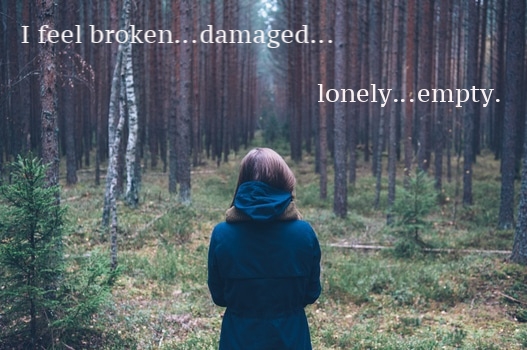Depression Treatment
Do you experience a persistently depressed mood or loss of interest in activities, causing you to not feel like yourself anymore?
Have your eating and/or sleeping habits changed? Eating too much or not feeling hungry at all? Have you experienced significant weight loss or weight gain? Are you sleeping all day or having insomnia? Having trouble getting out of bed?
Is there no sense of hope, pleasure or joy in your life? Where nothing seems to matter anymore. You’re locked inside of your head. You feel like a failure. Useless.
Do you cry a lot for no apparent reason or you cry over something insignificant?
Do you just want to feel normal again and be able to engage in life like other people do?
Do you “put on a happy face” when you are around others, afraid of what people might think of you if they found out you had depression?
Are you physically, emotionally and mentally exhausted? Tired all the time? Everything hurts.
Does everything seem to be moving in slow motion and life doesn’t seem real anymore? You’re just going through the motions of life. You don’t recall a time in your life when you didn’t feel this way.
Do you experience lack of concentration, trouble focusing? Have difficulty making decisions? Do you walk around in a complete fog? Are you numb to everything?
Do people around you irritate or agitate you? For seemingly no reason?
Have you had suicidal ideation or thoughts that suicide would be a relief. Do you feel like your life is meaningless and the world would go on just fine without you?
Are you using drugs or alcohol for relief?
Are you anxious all the time? Or in a state of perpetual fear? You’re not even sure what it is you are afraid of.
Do you feel a sense of doom…….everything is gray, and somber? You are suffocating. You feel like a shell of your former self. You only vaguely recall who you once were. You’re in a dark hole and see no way out. You want to isolate.
Does it feel like no one seems to understand what you’re going through? They don’t seem to want to be around you anymore. They tell you to “Just snap out of it” or “Pull yourself together.” You’re left feeling more alone, empty and frustrated.
Clinical Depression comes in different forms and affects all ages, genders, ethnicities and cultures, across all demographics.
Feelings of sadness, grief, and depression can accompany any life change, relationship breakup, serious illness or life challenge. Once people process the situation or event, they recover and their life is in balance again. Clinical depression is very different. When someone experiences persistent and intense feelings of sadness for extended periods of time, then they may have Major Depressive Disorder (MDD).
To have a clinical diagnosis of MDD a person must have a depressed mood or a loss of interest or pleasure in daily activities for more than two weeks. This mood represents a change from the person's normal mood state. The mood state would also impair functioning in the social, occupational and educational areas of the person's life.
A major depressive episode is also characterized by the presence of 5 or more of these symptoms:
Persistent sad, anxious or "empty" mood, most of the day, every day
Sleeping too much or too little, middle of the night or early morning waking
Reduced appetite and weight loss, or increased appetite and weight gain
Loss of pleasure and interest in activities once enjoyed, including sex
Restlessness, irritability
Persistent physical symptoms that do not respond to treatment (such as chronic pain or digestive disorders)
Difficulty concentrating, remembering or making decisions
Fatigue or loss of energy
Feeling guilty, hopeless or worthless
Thoughts of suicide or death
Persistent Depressive Disorder (formerly Dysthymic Disorder)
Persistent Depressive Disorder is experienced as a less severe but more chronic form of major depression. Symptoms usually last for at least two years, and often for much longer than that, and interferes with your ability to function and enjoy life.
Bipolar Disorder
This is a disorder associated with episodes of mood swings ranging from depressive lows to manic highs. Bipolar disorder can be extremely distressing and disruptive for those who have this disease, their spouses, family members, friends and employers. Although there is no known cure, bipolar disorder is treatable, and recovery is possible. Individuals with bipolar disorder have successful relationships and meaningful jobs. The combination of medications and psychotherapy helps the vast majority of people return to productive, fulfilling lives.
We can help.
Psychotherapy, also known as psychological therapy or talk therapy, is an effective treatment for people with mood disorders. It involves meeting with a therapist on a regular basis to talk about your condition and related issues. Psychotherapy can help you:
adjust to a crisis or other stressful event
discuss your feelings and fears with someone who will not judge you
replace negative beliefs and behaviors with positive healthy ones
improve your communication skills
learn new coping tools
increase your self-esteem and self confidence
regain a sense of balance and control in your life
Cognitive-behavioral therapy (CBT) is highly effective and commonly used alone or in combination with medication for the effective treatment of depression. CBT helps people find new ways of dealing with negative thoughts and behaviors and helps them become more aware of how their beliefs or actions are contributing to depression. Essentially, it helps a person restructure the underlying belief systems that drive destructive thinking patterns.
Your treatment plan for a mood disorder will depend on several factors: Are you willing to take medication, engage in therapy or try alternative methods? Depending on the severity and type of mood disorder, you may have no choice but to take medication to manage your symptoms. Make sure you have ruled out a medical condition or current medication that you are taking that might be causing symptoms.
The most efficacious treatment combines medication with psychotherapy. Antidepressant medications are often the first line of treatment used for clinical depression, and they are prescribed alone or in addition to therapy. Because there are so many different kinds of antidepressants, finding the one that works for you can sometimes take time. You will have to see how your body responds to the medication that your doctor prescribes and whether or not you can tolerate any side effects. Common treatments of mood disorders include:
Antidepressant medications and mood stabilizers
Antipsychotic medications if indicated to treat disordered thought patterns and altered perceptions
Hospitalization for coexisting medical problems, serious complications, severe disorders, or substance abuse
Identification and treatment of coexisting conditions
Individual therapy
Group therapy
Not all treatments will work for everyone. For treatment resistant depression, there are other options such as brain stimulation techniques such as electroconvulsive therapy (ECT or electroshock therapy), transcranial magnetic stimulation (TMS), or vagus nerve stimulation.
Bipolar or Depression Support Groups can be a great way to engage with other people who may be dealing with similar situations. Here you can share and listen to other people's experiences and struggles in a way that helps reduce isolation and loneliness.
The outcome of treatment is determined by several factors, including the severity of diagnosis, level of functioning prior to onset of symptoms, degree of motivation for treatment, level of social or family support and one's ability to comply with medication and/or psychotherapeutic regimen. With proper treatment, people with mood disorders are living full, healthy, and productive lives.
You may be ready to take the next step toward counseling, but still have some questions or concerns…
Can’t I just take medication for my mood swings?
Sometimes psychotherapy may help you to cope with difficult events and may be enough to treat your mood disorder. In other cases, however, medication may be prescribed to correct a chemical imbalance. Depending on your diagnosis, it may be crucial to take medication in order to control your moods. If you have Bipolar I or II disorder, you'll typically need mood-stabilizing medication to control manic or hypomanic episodes. Mood stabilizers are medicines that treat and prevent highs (manic or hypomanic episodes) and lows (depressive episodes). They also help to minimize the negative effects of mood states on functioning at work, school or social situations. Doctors use a number of different classes and brands of drugs to treat bipolar disorder such as lithium, anticonvulsants, antipsychotics, and sometimes benzodiazepines. Although antidepressants are effective against depression, treatment for depression doesn’t always involve medication. Whether or not you need to take medication is a conversation for you to have with your doctor. You are free to talk through your feelings about taking meds in our sessions. Any decision to take or come off of your meds should be under your doctor’s care.
I’m not sure I need help. I’ll just give it time and it should resolve on its own.
For most people, symptoms do not resolve on their own. Either they get worse or the person stays in a low level chronic state to the point where they don’t even know what it feels like to not be depressed. Sometimes, due to the gradual onset of symptoms, you lose perspective, and you don't realize that what you're experiencing is abnormal. Someone else has to tell you that your behavior is unbalanced. Sometimes you want to just "wait it out," and you don't get help because you don’t want people knowing that you have a mental illness or because you’re too depressed and lethargic to get out of bed. In the case of mania, you don’t seek help because you enjoy the euphoric feeling of being invincible. Until it gets you into trouble. Unlike normal stress and sadness, the symptoms of mood disorders persist and do not go away no matter how much the individual desires. Most people benefit from counseling as a way to better understand their mental illness and from learning to manage their symptoms and the course of their illness. Seeking professional help in terms of medication management or psychotherapy, in addition to lifestyle changes provides the most effective way to manage mood disorders. In some cases, mood disorders can be life threatening.
Always seek immediate medical care (call 911) if you, or someone you are with, have any of these life-threatening symptoms including:
Being a danger to yourself or others, including threatening, irrational or suicidal behavior
Feelings of wanting to die
Hearing voices or seeing things that do not exist
Inability to care for your basic needs
I’ve tried counseling before and it didn’t work for me.
There are many variables that can affect the success of counseling. One of the most important factors is the fit between the therapist and the client and how comfortable the client is with him/her. Other factors include the therapist’s experience and training in a particular area, realistic goals, length of therapy, motivation level and commitment of the client. When seeing a new therapist make sure you share with them what you liked and didn’t like about your previous counseling experience. Most therapists are trained and experienced in a variety of different counseling approaches and styles, and can adapt to your personal needs. The important thing is to communicate to your therapist if you feel like you are not progressing as you expected. And if the relationship is simply not working, the therapist will be happy to refer you to someone else.
I can help you reduce your symptoms and live the life you’ve always wanted. I encourage you to contact me here or by phone: 904-543-6055 to schedule an appointment or free 15-minute consultation. Your inquiries will always remain confidential, and I return calls within 24 hours, usually sooner!














